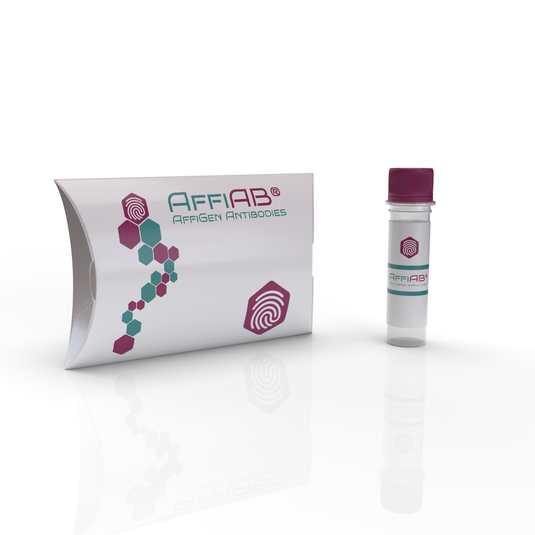AffiAB® Goat Anti-REP1 Polyclonal IgG Antibody
The AffiAB® Goat Anti-REP1 Polyclonal IgG Antibody is a reliable and highly sensitive antibody designed to detect and quantify expression of the REP1 gene. Its specificity and purity offer superior accuracy with consistent results.
Host: Goat
Species: Human
Description:
The AffiAB® Goat Anti-REP1 Polyclonal IgG Antibody is an antibody specifically designed to target and bind to REP1 (Rab escort protein 1). It is produced by immunizing goats with REP1 protein, and the resulting polyclonal antibody is purified and used for various research applications.
REP1 is a protein involved in the intracellular transport and maturation of Rab proteins, which play a crucial role in regulating vesicle trafficking and membrane fusion processes within cells. By specifically recognizing REP1, this antibody enables researchers to study the function and localization of REP1 in different cellular contexts.
The AffiAB® Goat Anti-REP1 Polyclonal IgG Antibody can be utilized in techniques such as immunohistochemistry, immunofluorescence, and Western blotting to detect and analyze the presence and distribution of REP1 in biological samples. By understanding the role of REP1 in cellular processes, researchers can gain insights into intracellular transport mechanisms and related diseases.
It is important to use appropriate controls and optimization protocols when using this antibody to ensure accurate and reliable results. Isotype controls, negative controls, and experimental controls should be included to validate the specificity of the antibody binding and minimize non-specific interactions.
In summary, the AffiAB® Goat Anti-REP1 Polyclonal IgG Antibody is a valuable tool for investigating the function and localization of REP1 in cellular processes. Its use contributes to the understanding of intracellular transport mechanisms and their implications in various biological contexts.
Gene Identifier/Accession Number: ENSG00000188419
Form: N/A
Concentration: 2.5 mg/mL
Type: Primary
Clonality: Polyclonal
Isotype: IgG
Conjugation: Unconjugated
Application: Western Blot
Storage: For continuous use, store at 2-8 °C for one-two days. For extended storage, store in -20 °C freezer. Working dilution samples should be discarded if not used within 12 hours.
Special instructions: The antibody solution should be gently mixed before use.
Goat Anti-REP1 Polyclonal IgG Antibody
In the intricate world of cell biology, researchers rely on a myriad of tools and techniques to decipher the roles and functions of various cellular components. Rab escort protein 1 (REP1), also known as CHM (Choroideremia protein), is a crucial player involved in intracellular trafficking and vesicular transport processes. The Goat Anti-REP1 Polyclonal IgG Antibody has emerged as a valuable research tool, enabling scientists to delve deeper into the mysteries of cellular trafficking and its implications in health and disease.
Unraveling the Significance of REP1
REP1 is a multifunctional protein that belongs to the Rab escort protein (REP) family. It plays a central role in the post-translational modification of Rab GTPases, essential regulators of vesicular trafficking. REP1 facilitates the prenylation of Rab GTPases, a process necessary for their correct localization and function in vesicle transport. Dysregulation of REP1 has been linked to Choroideremia, a rare X-linked genetic disorder that results in progressive vision loss.
Goat Anti-REP1 Polyclonal IgG Antibody: An Overview
The Goat Anti-REP1 Polyclonal IgG Antibody is specifically designed to target REP1 proteins. This antibody is generated through immunization of goats with purified REP1 protein, resulting in a polyclonal mixture of immunoglobulins G (IgG) capable of recognizing various epitopes on the REP1 molecule. Its polyclonal nature enhances its utility, making it an invaluable tool for diverse experimental applications.
Applications of Goat Anti-REP1 Polyclonal IgG Antibody
Western Blotting: Researchers employ this antibody in Western blot assays to quantify REP1 protein levels in cell lysates or tissue extracts. This application is crucial for studying REP1 expression changes in response to various experimental conditions.
Immunoprecipitation (IP):
The antibody is used in IP assays to isolate REP1-associated protein complexes, offering insights into its interactions with other molecules and its involvement in specific cellular processes.
Immunocytochemistry (ICC) and Immunohistochemistry (IHC):
Scientists use this antibody in ICC and IHC experiments to visualize the subcellular localization of REP1 within cells and tissues. These techniques enable the assessment of changes in REP1 distribution under different biological contexts.
Disease Research:
The dysregulation of REP1 is implicated in Choroideremia and other disorders related to vesicular trafficking. Researchers utilize this antibody to explore the underlying mechanisms and potential therapeutic targets associated with REP1-related pathologies.
Functional Studies:
The Goat Anti-REP1 Polyclonal IgG Antibody can be applied in functional assays to investigate the impact of REP1 modulation on intracellular trafficking, vesicle transport, and cellular homeostasis, providing crucial insights into its cellular functions.
Conclusion
The Goat Anti-REP1 Polyclonal IgG Antibody is a valuable asset in cell biology and cellular transport research. Its specificity, versatility, and reliability make it an indispensable tool for investigating the roles of REP1 in intracellular trafficking processes and understanding its implications in health and disease. As researchers continue to explore the intricacies of cellular functionality, this antibody remains a trusted partner in their pursuit of knowledge and scientific advancement.

